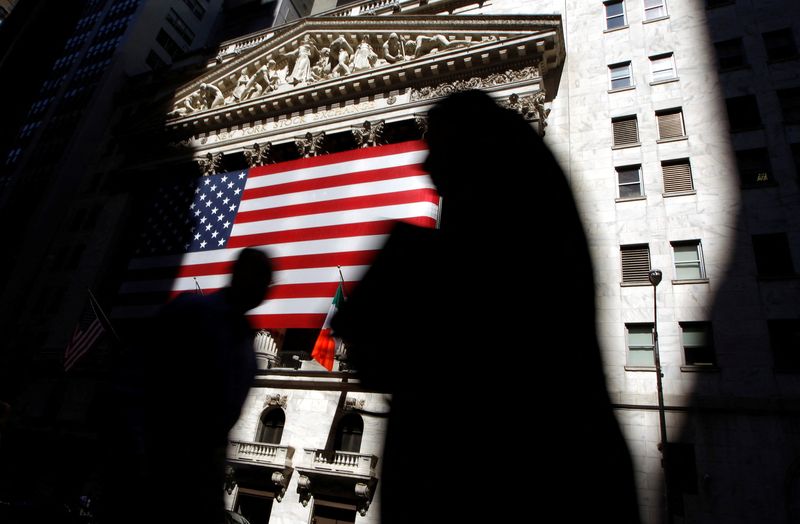Investing.com -- U.S. stock futures oscillated around the flatline, as the main indices on Wall Street are on track to post their worst month of 2023. Meanwhile, Micron Technology (NASDAQ:MU) shares fall steeply in premarket trading after the U.S. chipmaker announced a wider-than-expected first-quarter loss forecast, and Facebook-owner Meta Platforms (NASDAQ:META) unveils a host of new artificial intelligence-powered products.
1. Futures steady as stocks face September slump
U.S. stock futures hugged the flatline on Thursday, with equities on pace to slump to their worst month of the year as investors fretted over the prospect of interest rates remaining higher for a longer period of time.
At 06:11 ET (10:11 GMT), S&P 500 futures added 4 points or 0.1% and Dow futures gained 33 points or 0.1%, while Nasdaq 100 futures were mostly unchanged.
In a mixed session on Wall Street on Wednesday, the benchmark S&P 500 inched marginally higher and the tech-heavy Nasdaq Composite climbed by 0.2%, while 30-stock Dow Jones Industrial Average was the laggard, dipping by 0.2%. With mere days left in both September and the latest quarter, all of the main indices are on track to fall to monthly declines, while the S&P 500 in particular is on course for its first three-month loss in a year.
Weighing on stocks has been a jump in the U.S. 10-year Treasury yield, which touched a level not seen since 2007 on Wednesday. Yields typically rise as prices decrease.
While the S&P 500 has still risen by 11% so far this year, much of these gains have been linked to a surge in technology stocks earlier in the year that was fueled by enthusiasm over artificial intelligence. While AI remains a hot topic, a hawkish Federal Reserve policy update last week has driven many traders to predict that borrowing costs will stay elevated for longer than previously anticipated.
2. Micron expands loss outlook
Shares in Micron fell in premarket trading after the U.S. chipmaker unveiled a projected loss in its fiscal first quarter that was wider than analysts' expectations.
The Idaho-based company said it now plans to report an adjusted loss per share of $1.07 during the period, steeper than estimates of $0.95, according to data cited by Reuters.
However, Micron's forecast of $4.40 billion in revenue -- plus or minus $200 million -- in its current quarter topped projections of $4.20B.
In an interview with Reuters, Chief Business Officer Sumit Sadana said that Micron has essentially placed a bet on turning a profit from its higher performing chips next year, adding that some of these samples have "blow[n] away" customers.
Investors are hoping that soaring AI demand will boost sales of Micron's high-bandwidth memory chips and help the group weather weakness in other end markets.
3. Meta unveils new AI chatbots
Meta Platforms is rolling out a range of new chatbots and products powered by artificial intelligence, as the tech giant aims to spur user engagement on its apps like Facebook and Instagram.
Speaking at Meta's developer conference in California, Chief Executive Mark Zuckerberg unveiled a digital assistant dubbed "Meta AI" that will be able to generate both text responses and digital images. Meta has also created a set of 28 chatbots that feature the pre-approved likenesses and voices of celebrities like rapper Snoop Dogg and football star Tom Brady that will aid users in everything from playing games to cooking meals.
Zuckerberg lauded the technology as more than just a tool to answer queries, but also a source of entertainment and a link between the virtual and real worlds.
At the same time, Zuckerberg announced that the latest version of its Ray-Ban smart glasses would incorporate Meta AI and delivered more details about the social media group's Quest mixed-reality headset. Both are expected to begin shipping in October.
The event underscored Meta's focus on harnessing AI after a year of sweeping cost cuts that included tens of thousands of job reductions. Investors have largely welcomed the strategy, with Meta's stock price surging since falling sharply last November.
4. Evergrande share trading suspended
Trading in Evergrande shares was halted in Hong Kong on Thursday in the wake of a report that the embattled property developer's chair was under police surveillance.
No explanation for the halt was given by either Evergrande or the exchange.
Bloomberg News reported on Wednesday that Evergrande Chairman Hui Ka Yan was taken away by police this month and is being monitored at a designated location.
It was the latest blow for the heavily-indebted group, which has become a focal point of a liquidity crisis in China's key property sector.
Evergrande has been attempting to gain creditors' approval to restructure its offshore debt, although this process was complicated when the company announced over the weekend that it would not be able to issue new debt because of an investigation into its mainland China division. That unit also missed a deadline to make 4 billion yuan in prinicipal and interest payments earlier this week.
Since resuming trading in late August following a 17-month suspension, shares in Evergrande have now tumbled by 81%.
5. Oil prices dip after surging on crude stock drop
Oil prices inched down on Thursday, but remained near their highest in more than a year after a fall in U.S. crude stocks added to worries over a tightness in global supplies.
Crude prices have jumped more than 30% over the past three months in response to production squeezes by Saudi Arabia and Russia, though the rally hit a bump last week on economic and demand concerns.
But data on Wednesday from the U.S. government showing crude stockpiles falling by more than anticipated reinvigorated the run-up in oil.
At 05:06 ET, New York-traded West Texas Intermediate, or WTI, crude futures were mostly unchanged at $93.64 a barrel, while London-traded Brent futures dipped by 0.2% to $94.20 per barrel.
